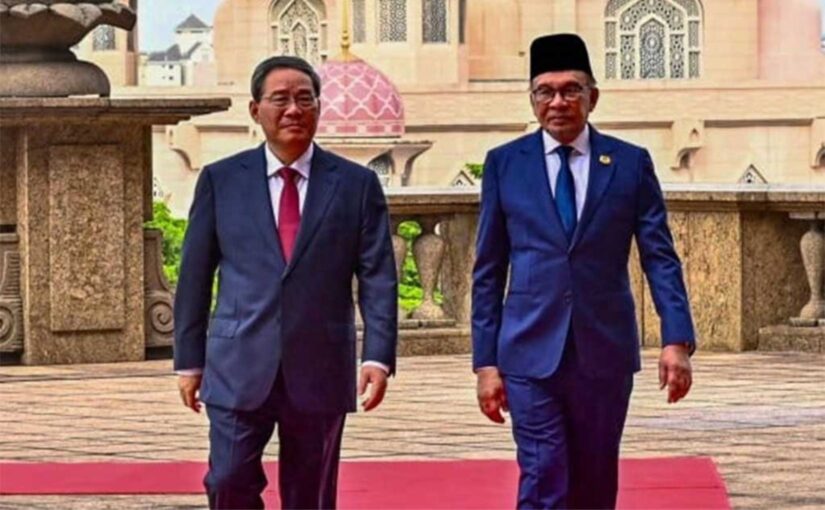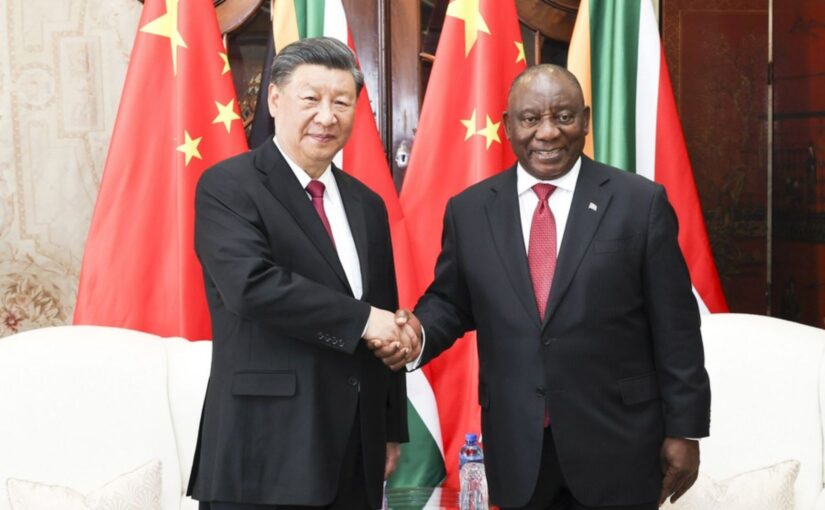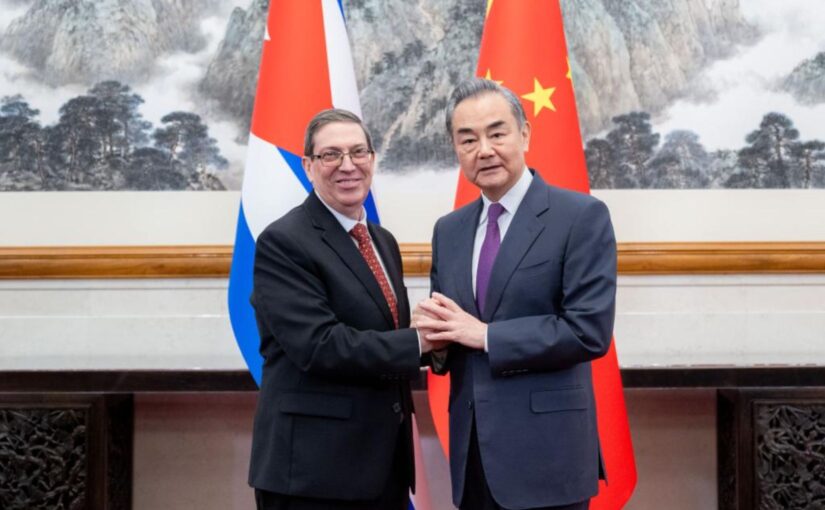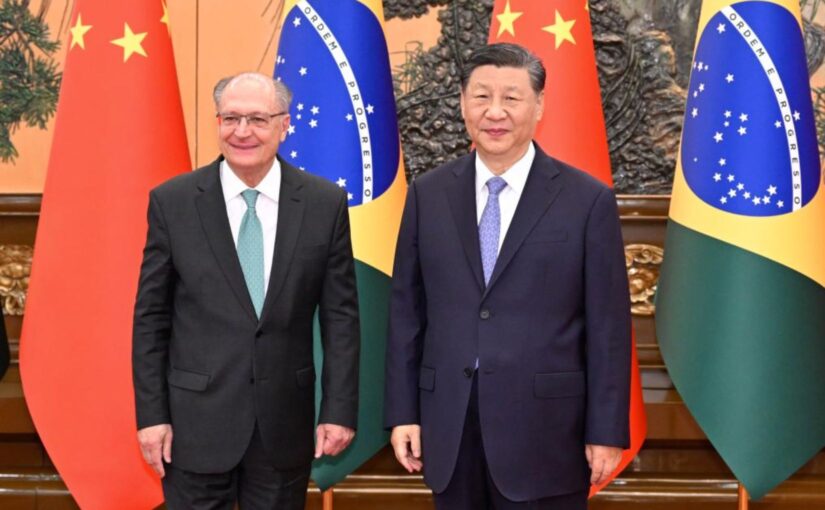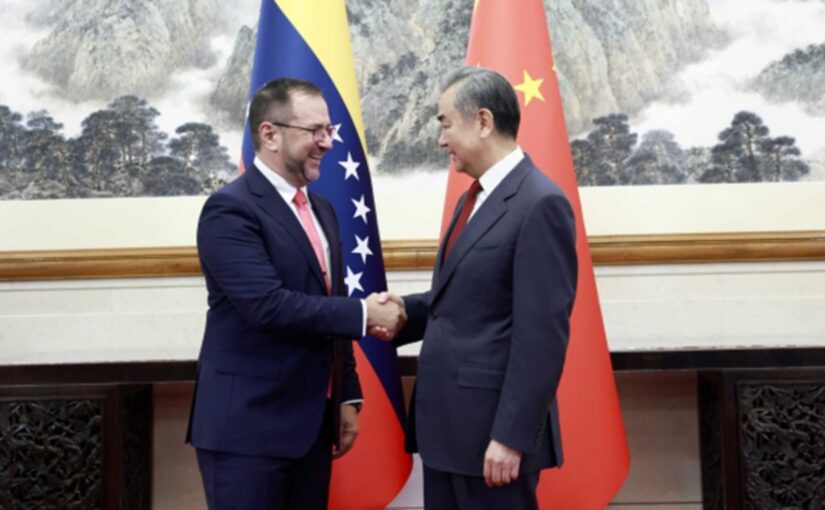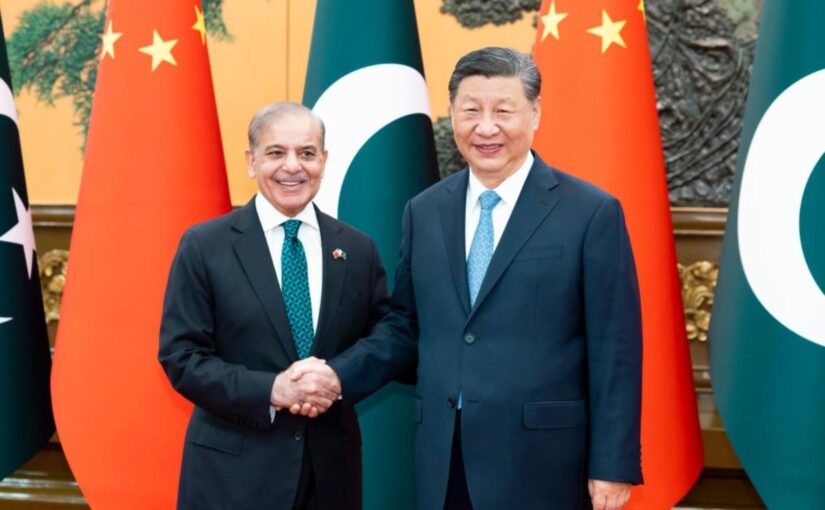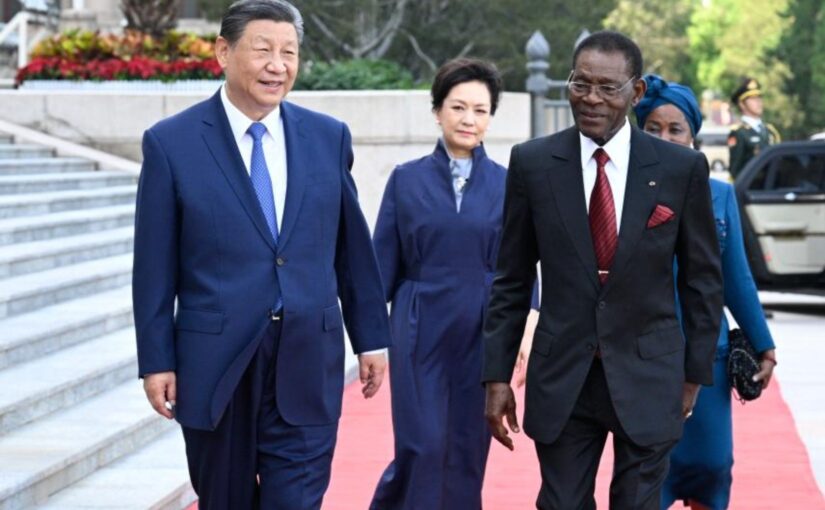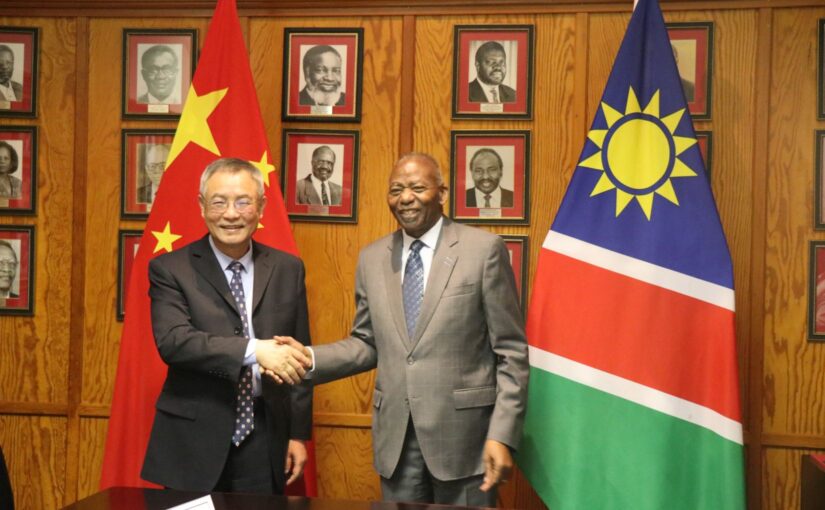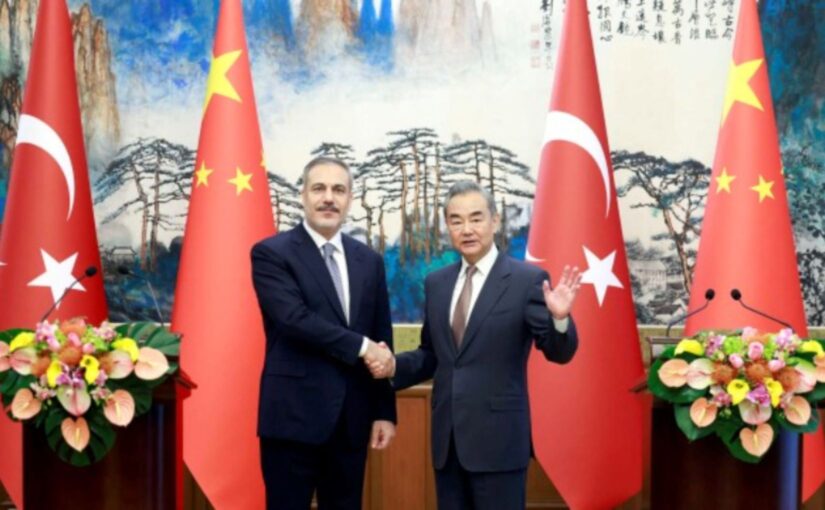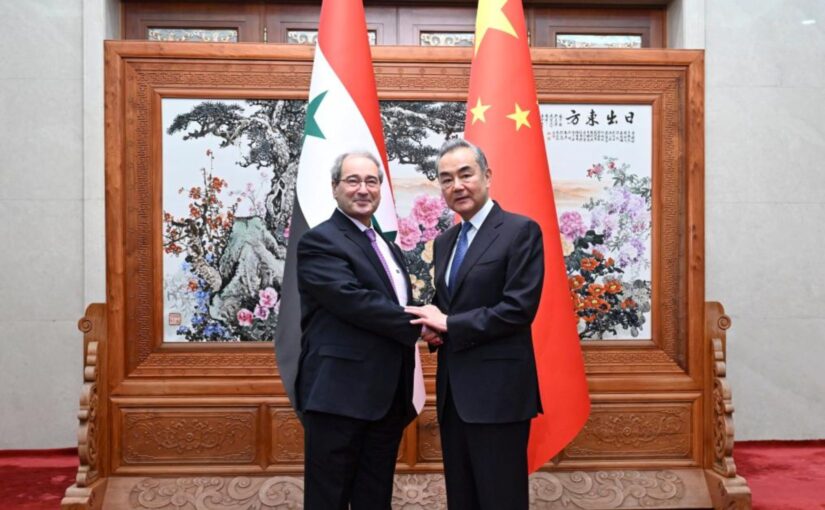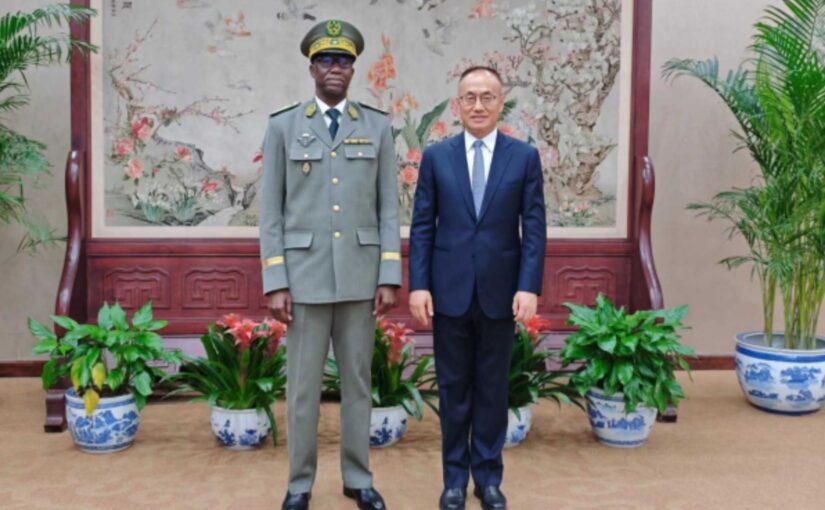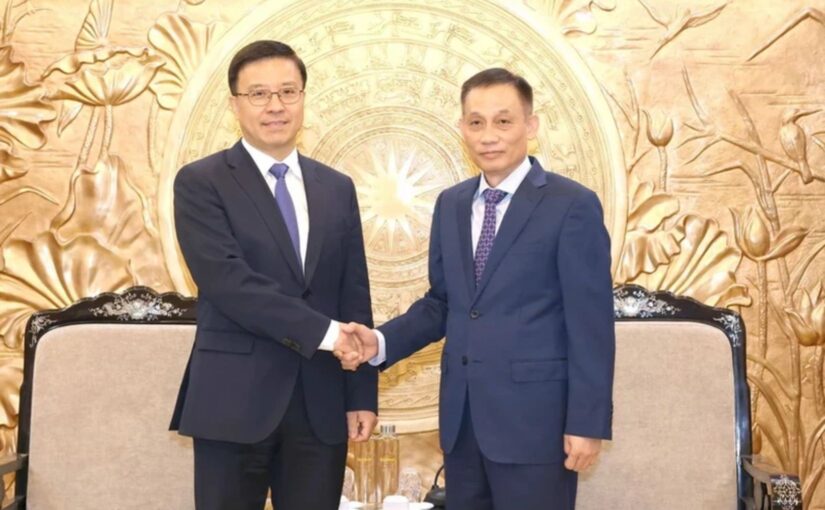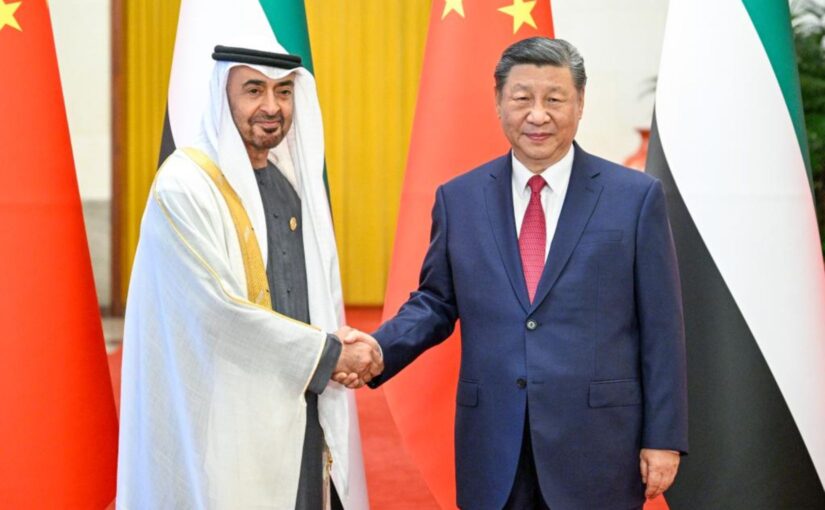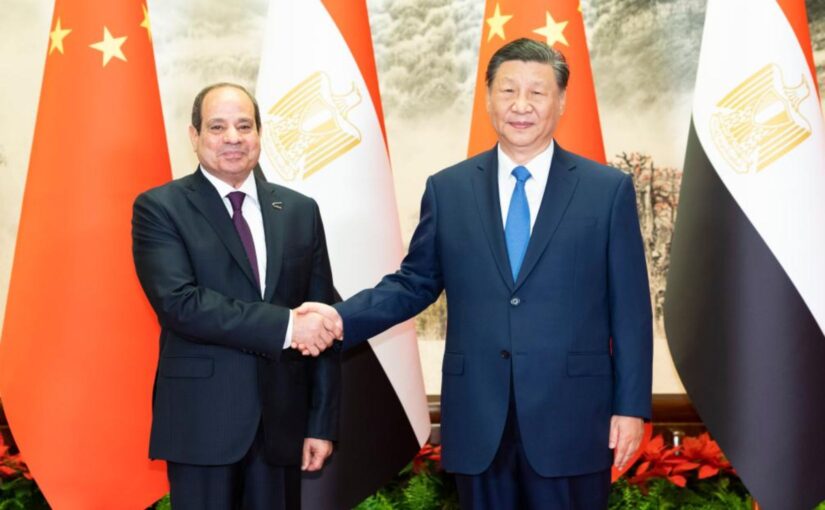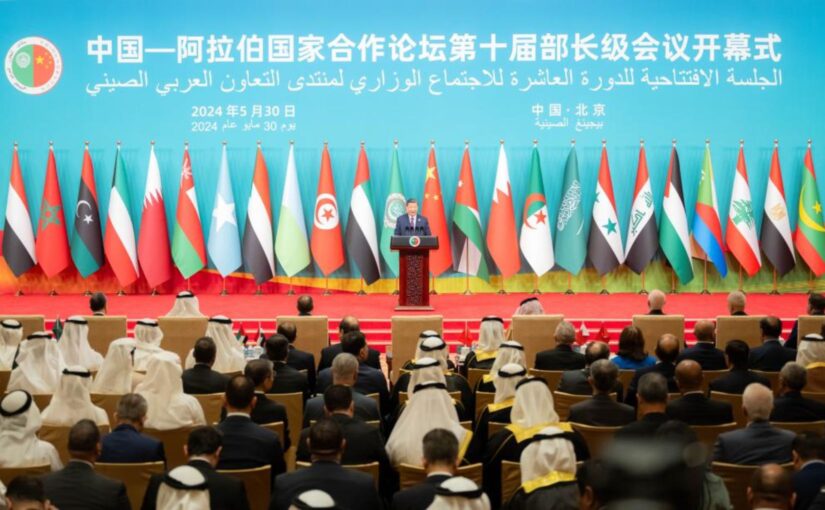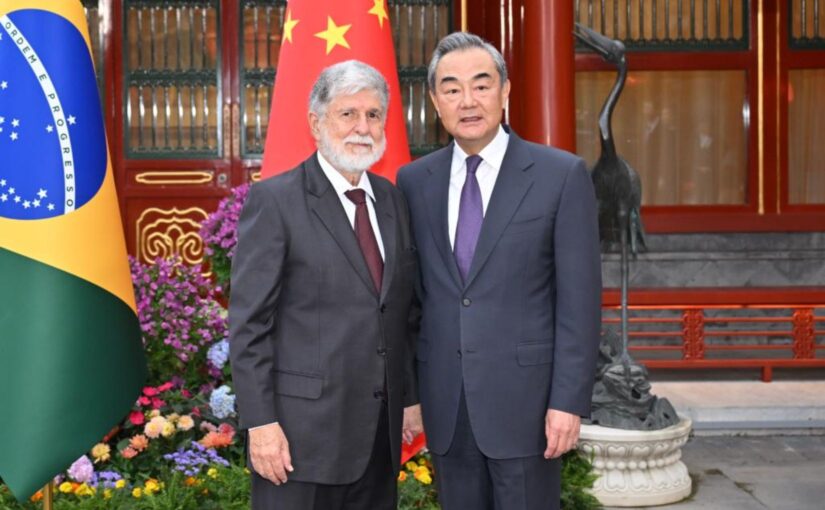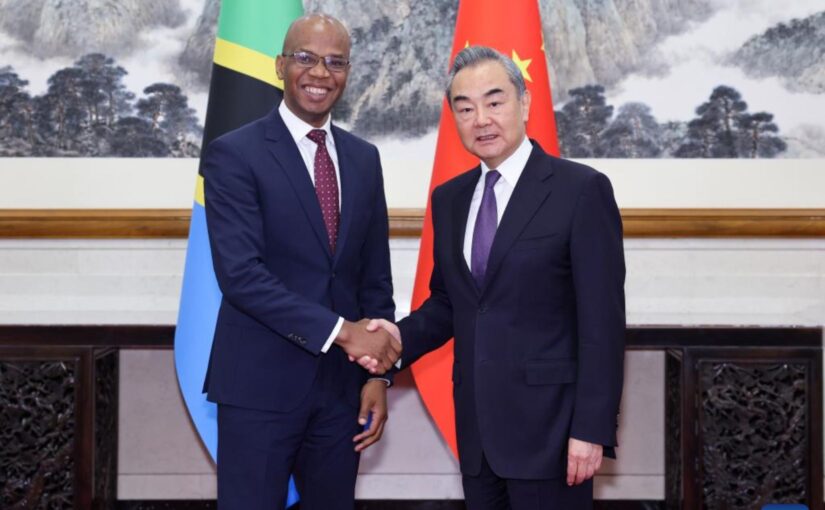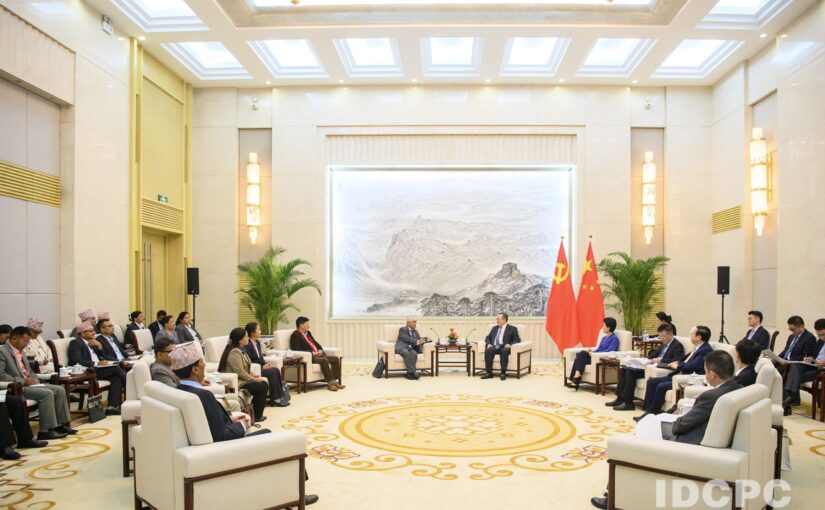Chinese Foreign Minister Wang Yi held bilateral meetings with a number of Arab foreign ministers who came to Beijing for the 10th conference of the China-Arab States Cooperation Forum, held on May 30.
When meeting with Iraqi deputy prime minister and foreign minister Fouad Hussein, Wang said that China firmly supports Iraq in safeguarding national sovereignty, security, unity and territorial integrity, supports the Iraqi government in developing the economy, improving people’s livelihood and combating terrorism, and opposes external interference in Iraq’s internal affairs.
In his meeting with Algerian Minister of Foreign Affairs and National Community Abroad Ahmed Attaf, Wang said that China and Algeria are sincere friends and natural partners. China is ready to continue to support and cooperate closely with Algeria to safeguard international fairness and justice, as well as the interests of developing countries, and jointly promote an early, full, just and lasting settlement of the Palestinian question.
Meeting with Syrian Foreign Minister Faisal Mekdad, Wang expressed congratulations on Syria’s return to the Arab League family. China supports the Syrian government in safeguarding national security, stability and development. It is believed that Syria’s return to the Arab League will play a constructive role in the development of China-Arab relations, and China-Syria relations will also gain new impetus with the further development of China-Arab relations.
CGTN further noted that Wang said that China appreciates Syria’s firm support on issues concerning China’s core interests and will, as always, speak out for Syria on multilateral platforms such as the UN Security Council.
Telesur added that both foreign ministers stressed the importance of making progress and intensifying practical cooperation and implementing the agreements reached during President Bashar Al-Assad’s visit to China last year.
Wang Yi also confirmed China’s support for the sovereignty, territorial integrity and legitimate right of Syria to recover its occupied lands in the Golan, as well as the fight against terrorism.
He further called on the United States to respect the territorial sovereignty of Syria and demanded that it stop plundering the wealth of its people and remove illegal unilateral measures that violate the development and welfare of nations.
“The heroic Syrian firmness under the leadership of President Bashar Al-Assad and his keen vision as a great leader will lead Syria to overcome all difficulties and achieve prosperity for the Syrian people,” Wang Yi said.
Meeting Saudi Foreign Minister Prince Faisal bin Farhan Al Saud, Wang said China is ready to work with Saudi Arabia to consolidate the political foundation of bilateral relations, enhance synergy of development strategies, expand cooperation in energy, investment, emerging industries, 5G communications, artificial intelligence, digital economy, aerospace and other fields, and promote green and sustainable development.
During the meeting with Somalian Foreign Minister Ahmed Moallim Fiqi, Wang said that China firmly supports Somalia in safeguarding national sovereignty and territorial integrity, achieving political stability, promoting security transition, and carrying out economic reconstruction.
China is ready to deepen bilateral cooperation in key areas such as agriculture, fisheries and health, and jointly promote Belt and Road cooperation with Somalia.
Fiqi said that Somalia adheres to the one-China principle, firmly supports China’s position on issues related to national reunification, thanks China for its selfless assistance to Somalia’s peace, security, development and revitalisation, hopes to continue to receive China’s support, and looks forward to more cooperation in infrastructure, energy, investment, health, security and other fields under the framework of the Forum on China-Africa Cooperation and the China-Arab States Cooperation Forum.
Wang Yi also met with the foreign ministers of Libya, Mauritania, Morocco and Kuwait, as well as with the Secretary-General of the League of Arab States.
Meanwhile, on May 31, Vice Foreign Minister Deng Li met with Undersecretary of the Foreign Ministry of Oman Sheikh Khalifa Alharthy. Deng said that China supports Oman in safeguarding national sovereignty, security and stability and in advancing economic diversification, and appreciates Oman’s support for China’s just position on issues related to its core interests. China regards Oman as an important partner in the Belt and Road cooperation, and is willing to strengthen strategic synergy with Oman, promote mutually beneficial cooperation in various fields, enhance communication and coordination on regional and international affairs, and achieve more positive progress in China-Oman strategic partnership.
The following articles were originally published by the Xinhua News Agency, CGTN, Telesur and on the website of the Chinese Foreign Ministry.
Top Chinese diplomat meets foreign guests
BEIJING, May 29 (Xinhua) — Chinese Foreign Minister Wang Yi, also a member of the Political Bureau of the Communist Party of China Central Committee, met respectively with foreign guests who came to China to attend the 10th ministerial meeting of the China-Arab States Cooperation Forum, in Beijing on Wednesday.
During the meeting with Abdul-Hamid Dbeibah, prime minister and foreign minister of the Government of National Unity of Libya, Wang said that China has always supported Libya in achieving stable development, and safeguarding its national sovereignty, independence and territorial integrity. China is ready to work jointly with Libya to further consolidate political mutual trust, enhance exchanges, and continuously enrich the connotation of the friendly and cooperative relations between the two sides.
Dbeibah said that Libya attaches great importance to developing relations with China and firmly adheres to the one-China principle. Libya expects China to play a greater role in promoting the early settlement of the Palestinian question.
When meeting with Iraqi deputy prime minister and foreign minister Fouad Hussein, Wang said that China firmly supports Iraq in safeguarding national sovereignty, security, unity and territorial integrity, supports the Iraqi government in developing the economy, improving people’s livelihood and combating terrorism, and opposes external interference in Iraq’s internal affairs.
Hussein said that developing relations with China is a diplomatic priority of the Iraqi government, and Iraq always firmly supports China in safeguarding its core interests. Iraq has been actively participating in the construction of the China-Arab States Cooperation Forum and is willing to continue to expand collective cooperation between the two sides, he added.
During the meeting with Ahmed Aboul Gheit, Secretary-General of the League of Arab States, Wang said that China is ready to work with Arab states, guided by the important consensus reached by the heads of state of China and Arab states, to deepen exchanges and cooperation in various fields, and play a constructive role in maintaining world peace and stability and resolving regional hotspots. China is ready to continue to work with the Arab League and Arab countries to promote an early, full, just and lasting settlement of the Palestinian question.
Gheit said the Arab side is ready to make joint efforts with China to open up broader prospects for richer and more diverse Arab-China relations. The Arab side always firmly adheres to the one-China principle, he added.
During the meeting with Mohamed Salem Ould Merzouk, Mauritania’s minister of foreign affairs, cooperation and Mauritanians abroad, Wang said that China will continue to firmly support Mauritania in pursuing a development path suited to its own national conditions, and oppose external forces interfering in Mauritania’s internal affairs. China is ready to continue to provide assistance within its capacity for Mauritania’s economic and social development, and is ready to cooperate closely with Mauritania to consolidate and expand China-Arab collective cooperation.
Merzouk said Mauritania firmly adheres to the one-China principle, and is ready to work with China to push forward the continuous development of Arab-China and Africa-China relations, and promote the building of a community with a shared future for humanity.
During the meeting with Algerian Minister of Foreign Affairs and National Community Abroad Ahmed Attaf, Wang said that China and Algeria are sincere friends and natural partners. China firmly supports Algeria in safeguarding national sovereignty, independence and territorial integrity, and opposes external forces interfering in Algeria’s internal affairs. China is ready to continue to support and cooperate closely with Algeria to safeguard the international fairness and justice, as well as the interests of developing countries, and jointly promote an early, full, just and lasting settlement of the Palestinian question.
Attaf said that Algeria adheres to the one-China principle, and is ready to further strengthen bilateral cooperation on all fronts and promote greater development of bilateral relations.
When meeting with Syrian Foreign Minister Faisal Mekdad, Wang expressed congratulations on Syria’s return to the Arab League family. China supports the Syrian government in safeguarding national security, stability and development. It is believed that Syria’s return to the Arab League will play a constructive role in the development of China-Arab relations, and China-Syria relations will also gain new impetus with the further development of China-Arab relations, he added.
Mekdad said under the guidance of the two heads of state, Syria is willing to work with China to promote the lasting and in-depth development of bilateral relations.
When meeting with Moroccan Foreign Minister Nasser Bourita, Wang said that China is willing to work with Morocco to deepen exchanges and cooperation in economy, trade, investment, industry, tourism and civil aviation, enhance public support for friendship between the two countries, and open up broader prospects for China-Morocco strategic partnership.
Bourita said Morocco attaches great importance to developing relations with China, and is willing to have close communication and coordination with China under the mechanisms of the China-Arab States Cooperation Forum and the Forum on China-Africa Cooperation.
Wang Yi: China-Syria strategic partnership features mutual trust and support
May 29 (CGTN) — Chinese Foreign Minister Wang Yi on Wednesday said China and Syria have formed a strategic partnership featuring mutual trust and support.
Wang, also a member of the Political Bureau of the Communist Party of China (CPC) Central Committee, made the remarks while meeting with Syrian Foreign Minister Faisal Mekdad, who is in Beijing to attend the 10th Ministerial Conference of the China-Arab States Cooperation Forum.
Congratulating Syria on returning to the League of Arab States (AL), Wang said China and Syria announced the establishment of a strategic partnership last September, drawing a new blueprint for bilateral relations.
China supports Syria in safeguarding its national independence, sovereignty, and territorial integrity, and supports the Syrian government in safeguarding its national security, stability and development, he said.
Wang said China appreciates Syria’s firm support on issues concerning China’s core interests and will, as always, speak out for Syria on multilateral platforms such as the UN Security Council.
It is believed that Syria’s return to the AL will play a constructive role in the development of China-Arab relations, and China-Syria relations will also gain new impetus, he said.
For his part, Mekdad said Syria fully supports all global initiatives proposed by China and is willing to work with China to build an international order featuring mutual respect, equal treatment and opposition to hegemony.
Syria unwaveringly adheres to the one-China principle, he said, adding that Taiwan is an inalienable part of Chinese territory, a fact that cannot be denied or challenged.
Foreign Ministers of Syria and China Hold Bilateral Meeting
May 29 (Telesur) — Syrian Foreign and Expatriate Minister Faisal Al-Mekdad held talks with his Chinese counterpart, Wang Yi, on relations between the two nations and forms of development.
Both foreign ministers stressed the importance of making progress and intensifying practical cooperation and implementing the agreements reached during President Bashar Al-Assad’s visit to China last year.
During the meeting, they discussed the international situation, especially that of the Gaza Strip and the rest of the occupied Palestinian territories, as well as the importance of ending the war and the entry of humanitarian aid and the end of the displacement of Palestinians.
Al-Mekdad underscored Syria’s support for China’s Taiwan, Hong Kong and Xining-related causes, and its responsibility for the one-China principle.
For his part, Wang Yi confirmed China’s support for the sovereignty, territorial integrity and legitimate right of Syria to recover its occupied lands in the Golan, as well as the fight against terrorism.
He also called on the United States to respect the territorial sovereignty of Syria, and demanded that it stop plundering the wealth of its people and remove illegal unilateral measures that violate the development and welfare of nations.
“The heroic Syrian firmness under the leadership of President Bashar Al-Assad and his keen vision as a great leader will lead Syria to overcome all difficulties and achieve prosperity for the Syrian people,” Wang Yi said.
He added that Syria belongs to the Middle East and there will be no comprehensive solution to the conflict in the region without Damascus.
Chinese FM meets Arab guests
BEIJING, May 31 (Xinhua) — Chinese Foreign Minister Wang Yi on Friday met respectively with some Arab guests who came to China to attend the 10th ministerial meeting of the China-Arab States Cooperation Forum in Beijing.
When meeting with Saudi Foreign Minister Prince Faisal bin Farhan Al Saud, Wang, also a member of the Political Bureau of the Communist Party of China Central Committee, said that China always gives priority to Saudi Arabia in its foreign relations. The leaders of the two countries have established solid mutual trust and friendship, pointing out the direction for the comprehensive strategic partnership between China and Saudi Arabia.
China is ready to work with Saudi Arabia to consolidate the political foundation of bilateral relations, enhance synergy of development strategies, expand cooperation in energy, investment, emerging industries, 5G communications, artificial intelligence, digital economy, aerospace and other fields, and promote green and sustainable development, Wang added.
Faisal said that under the care and guidance of the leaders of the two countries, Saudi Arabia-China cooperation in various fields has yielded fruitful results. Saudi Arabia will continue to be firmly committed to expanding mutually beneficial cooperation between the two countries in various fields and promoting the sustainable development of Saudi Arabia-China comprehensive strategic partnership. Faisal thanked China for upholding a just position on the Palestinian issue.
During the meeting with Somalian Foreign Minister Ahmed Moallim Fiqi, Wang said that China firmly supports Somalia in safeguarding national sovereignty and territorial integrity, achieving political stability, promoting security transition and carrying out economic reconstruction.
China is ready to deepen bilateral cooperation in key areas such as agriculture, fishery and health, jointly promote the implementation of the Belt and Road cooperation and other global initiatives put forward by China in Somalia, Wang added.
Fiqi said that Somalia adheres to the one-China principle, firmly supports China’s position on issues related to national reunification, thanks China for its selfless assistance to Somalia’s peace, security, development and revitalization, hopes to continue to receive China’s support, and looks forward to more cooperation in infrastructure, energy, investment, health, security and other fields under the framework of the Forum on China-Africa Cooperation and the China-Arab States Cooperation Forum.
During the meeting with Comorian Foreign Minister Dhoihir Dhoulkamal, Wang thanked Comoros for supporting China’s legitimate propositions on issues concerning its core interests and major concerns. China is ready to strengthen exchanges with Comoros at all levels, promote high-quality Belt and Road cooperation, deepen cooperation in poverty alleviation, education and training, medical care and other fields, and import more high-quality products from Comoros.
Dhoulkamal said that Comoros firmly supports China in safeguarding its territorial sovereignty. The Belt and Road Initiative helps Arab and African countries achieve common development, and Comoros will continue to actively participate in it.
When meeting with Kuwaiti Foreign Minister Abdullah Ali Al-Yahya, Wang said that China appreciates Kuwait’s active commitment to promoting the solidarity and cooperation between China and Arab states, and supports Kuwait in playing a greater role in international and regional affairs.
China is ready to work with Kuwait to implement the important consensus reached by the two heads of state, actively promote cooperation in renewable energy, sewage treatment, investment, new energy, digital economy, artificial intelligence and other fields, strengthen cultural and people-to-people exchanges, and promote the deepening of China-Kuwait strategic partnership, Wang added.
Al-Yahya said that under the leadership of the two heads of state, Kuwait-China relations have entered the best period in history. Kuwait regards China as a long-term and reliable strategic partner, and looks forward to strengthening high-level exchanges with China, jointly promoting the Belt and Road cooperation, and expanding economic, trade and investment cooperation.
Al-Yahya thanked China for upholding a just position on the Palestinian issue. Kuwait will continue to work to promote the cooperation between Arab states and China to achieve greater results, Al-Yahya said.
Vice Foreign Minister Deng Li Meets with Undersecretary of the Foreign Ministry of Oman Sheikh Khalifa Alharthy
June 1 (FMPRC) — On May 31, 2024, Vice Foreign Minister Deng Li met with Undersecretary of the Foreign Ministry of Oman Sheikh Khalifa Alharthy, who came to China to attend the 10th Ministerial Conference of the China-Arab States Cooperation Forum.
Deng Li said that China and Oman have a traditional friendship, and that in recent years, the political mutual trust between the two countries has been continuously strengthened, and practical cooperation in various fields has been promoted in an orderly manner. China supports Oman in safeguarding national sovereignty, security and stability and in advancing economic diversification, and appreciates Oman’s support for China’s just position on issues related to China’s core interests. China regards Oman as an important partner in the Belt and Road cooperation, and is willing to strengthen strategic synergy with Oman, promote mutually beneficial cooperation in various fields, enhance communication and coordination on regional and international affairs, and achieve more positive progress in China-Oman strategic partnership.
Sheikh Khalifa Alharthy said that Oman and China have a time-honored friendship. Oman attaches great importance to the development of the Oman-China strategic partnership, and will continue to firmly support the one-China principle and deepen friendly cooperation in such fields as economy and trade, investment, energy as well as people-to-people and cultural exchanges. Oman appreciates China’s impartial position as a permanent member of the United Nations on regional and international hotspot issues, and is willing to work with China to make unremitting efforts to maintain regional peace and stability.
The two sides also had an exchange of views on the Palestinian question, among others.
